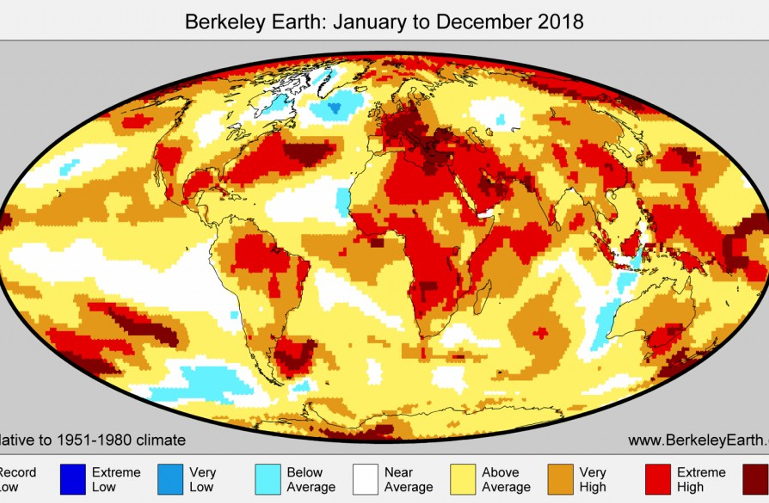In 2018, a remarkable 29 countries plus Antarctica set individual records for the hottest year ever. Meanwhile, no country saw a record cold year.
That’s the finding of the Berkeley Earth scientific team, which points out that 2015 through 2018 were the four hottest years since records began in 1850 — “a period of significant warmth well above all previous years since 1850. This reflects the long-term trend towards global warming.”
Berkeley Earth, a nonprofit research organization, provides independent analysis of global temperature records, but its findings of record global warming are especially noteworthy because the group was originally founded with $150,000 from the Charles G. Koch Charitable Foundation. Billionaire Charles Koch is a long-time funder of climate science denial.
In fact, Berkeley Earth’s founder and scientific director, physicist Richard Muller, was a long-time climate skeptic who became a “converted skeptic” in 2012 after his team independently reviewed more than 150 years of data.
The team, however, no longer receives Koch funding.
For its latest findings, the team analyzed “19 million monthly-average temperature observations from 46,000 weather stations” on land since 1850, including 205,000 monthly averages in 2018 alone. They combined that with ocean-based data, some “374 million measurements collected by ships and buoys, including 19 million observations obtained in 2018.”
Berkeley Earth had been planning to announce its findings on January 17 with NASA and the National Oceanic and Atmospheric Administration (NOAA). But the partial government shutdown — which lasted 35 days — thwarted that plan, so last Thursday the Berkeley team went forward on their own.
Following the end of the shutdown last Friday, NASA tweeted out on Monday morning that they will “announce a new date as soon as we determine how long it will take to catch up on analyzing the Dec 2018 station data, prepare slides, etc.”
The 29 countries that set annual temperature records last year are in Europe and the Middle East, including Bahrain and Qatar. Most major European countries made the list — from Austria, Belgium, Bulgaria, and Bosnia and Herzegovina, to Croatia, Czechia, and France, as well as Germany, Greece, Hungary, Italy, Poland, Slovakia, and Switzerland.
As the Berkeley team notes,
“The heatwave which affected Europe in 2018 included by far the warmest May to October average that has been observed since record-keeping began.”
Berkeley Earth’s finding that 2018 was “the warmest year thus far observed in Antarctica” is especially worrisome in light of the recent report that warming ocean waters drove a 6-fold increase in annual ice mass loss from the Antarctic ice sheet between 1979 and 2017.
This unprecedented record-setting may be one reason why more than 80 countries participated in a major U.N. Security Council meeting Friday on climate, which E&E News called “an unusually high turnout for an open debate.” The vast majority of countries urged that climate change be considered a significant risk factor by the council going forward.
“A new Dark Age will descend on most of the planet as never before,” warned Philippines’ foreign minister, Teodoro Locsin at the meeting. “And unlike in the past, the darkness will never be lifted. No age of enlightenment will follow. Human life won’t be worth living except for brutes. And there are quite a few of those already in countries denying climate change and refusing its challenges.”
Teaser photo credit: Berkeley Earth.





